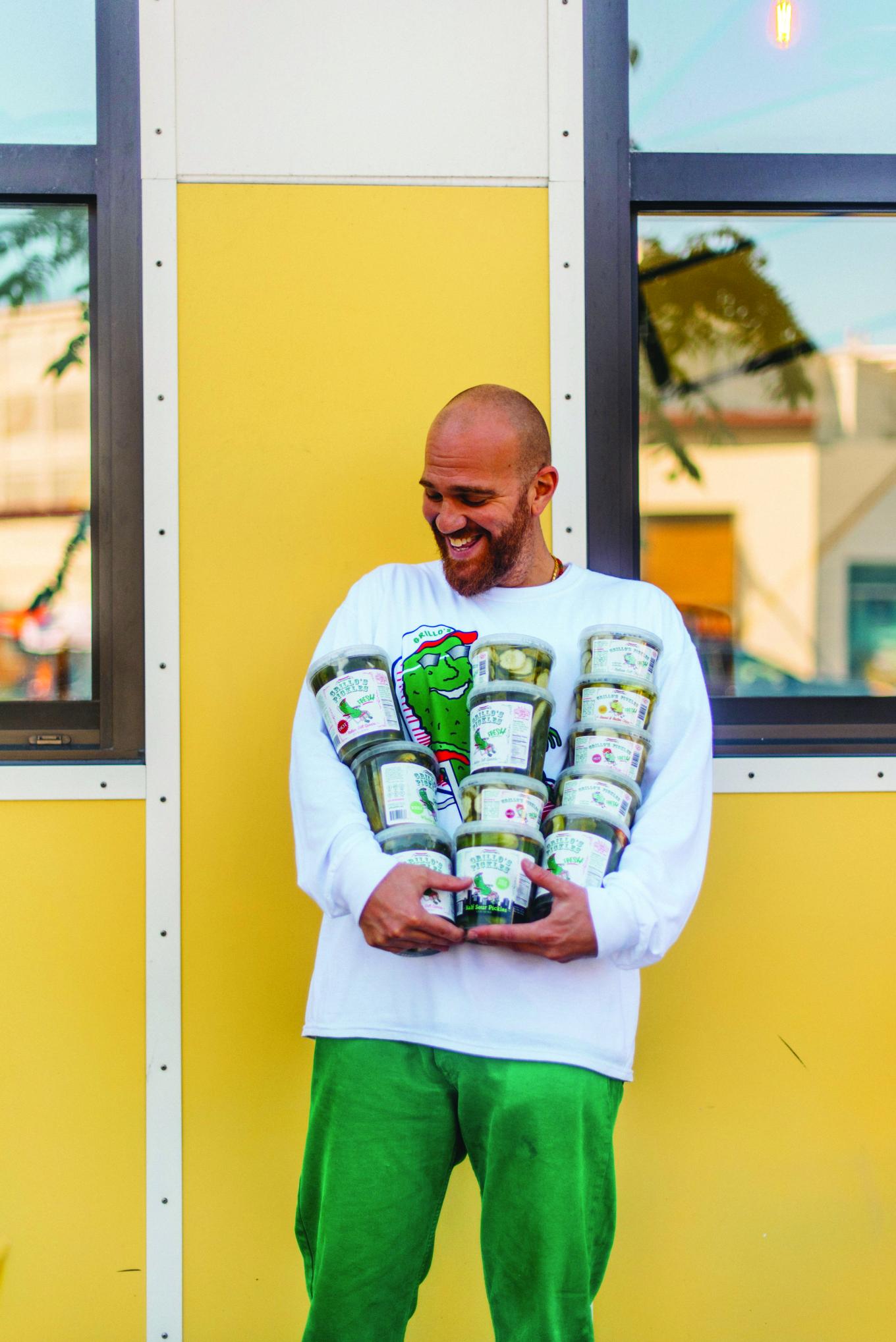
It was in a moment of despair that Travis Grillo ’06 came up with a million-dollar idea.
After four productive meetings with a recruitment team at Nike, Grillo thought he was about to land his dream job as a product line manager. The company had flown him in for meetings at headquarters; his design for a surf shoe received good feedback; he’d even chatted with Nike co-founder Phil Knight. The job would pay the bills and allow him to be creative while tapping into the sculpting and design skills he’d honed as a ceramics major at Central.
He didn’t get the job.
But shortly thereafter Grillo pursued a new path — one that started at his family’s home in Norwich and led to a thriving business venture in Boston of which he is founder and CEO: Grillo’s Pickles.
And just this March, Grillo released a line of sneakers he designed in partnership with Patrick Ewing’s footwear brand. The $140 limited edition shoes — complete with Grillo’s Pickles logo — sold out.
The home-style connection
Grillo says his friends got a good laugh when he said he was going to launch a pickle company, but the idea wasn’t too far-fetched; he grew up watching and helping his father and grandfather make pickles at their home in Norwich. The recipe is Grillo’s grandfather Sam’s creation, and it drew a loyal fan base among family and friends, including Grillo’s classmates at Central.
“I would bring these pickles into my dorm room and that was pretty much my first marketing effort, because I met people that weren’t around my hometown who had already tried this pickle,” he says.
A recurring theme in his classmates’ feedback became a guiding principle for Grillo’s future enterprise.
“I remember everyone eating them, and people I met from all over the world — I remember a girl from Africa named Nadia, a guy from Poland — would say it reminded them of their family. So, this pickle was actually giving people who were away from their families a nice thought of home.
“That whole idea has bled into what I’ve created because even now people eat the pickles and say they remind them of their nana or grandpa,” he adds. “The pickle itself — because of the ingredients, because they’re fresh and natural — bring people back home, and I think that’s important for a brand.”
The key perhaps lies in the simplicity of the recipe: a vinegar and salt brine, dill, garlic, cucumbers, and a grape leaf. Grillo says the grape leaves contain an enzyme that boost the crunch of the cucumbers and add a distinctive flavor note.
Despite the mass quantities his company is producing — it’s on track to sell 10 million pounds of pickles this year — Grillo has strict standards for his ingredients. No sodium benzoate, calcium chloride, or yellow number 40 — common ingredients in other commercial pickles.
“Grillo’s secret is using quality, Grade A cucumbers. I pay the highest premium for all our produce. We grow our dill organically, and I only use California garlic.”
West Coast garlic, Grillo says, has the best flavor and doesn’t turn yellow when pickled.
To this day, Grillo’s Pickles is one of the few mainstream pickles that have maintained farmers-market-level quality, with help from a dozen or so quality control staffers who make sure the recipe retains its integrity.
“What we’re selling nationally to Walmart, Target, Publix, all these big grocery stores, is the same product I sold in the farmer’s market,” Grillo says. “I didn’t change a darn thing, which is awesome.”
From pickle cart to Walmart
After he didn’t get the job at Nike, Grillo says he had a moment of clarity while snacking on one of his pickles.
“I’m eating this pickle and a sort-of cartoon lightbulb goes off in my head,” he says, “and I realized I was going to start a pickle company.”
That was in 2008, around the time Grillo relocated to Boston. When he found a space to make and pack pickles at the Katsiroubas Bros. produce warehouse in Boston, he was in business.
Grillo quickly became a local celebrity when he brought a wooden cart to Boston Common and set up his first pickle shop. The prices were right — two spears for $1, or a quart for $6 — and the pickle costume he frequently wore to work no doubt helped draw customers.
The cart did a steady business for four years, with Grillo and his friends manning it for the first two years. Then came the pop-up pickle shop in Cambridge, an enterprise that was supposed to last a month. In the end, popular demand kept it open for three years.
Whole Foods was the first national grocery chain to take notice of Grillo’s Pickles.
“They found me on the street,” Grillo notes, who delivered his first load of pickles to a local Whole Foods in his own van. That delivery quickly sold out, thanks in part to clever social media marketing by Grillo, who continued to tweet out updates whenever his pickles were back in stock at the store.
The buzz around Grillo’s Pickles eventually brought the product into multiple Whole Foods stores. Grillo himself started doing in-store tastings and demos while his new business partner, Eddie Andre, worked the cart and pop-up shop.
With the boom in sales Grillo was able to hire sales reps while he “kept the circus moving.” Part of that circus act was educating buyers at all levels about what makes his pickles unique, particularly at a time when the market for locally and responsibly sourced products is expanding rapidly.
To Grillo, the appeal is all about authenticity — as a pickle-maker and as a business.
“We care about the consumer. We care about what we put in the product — we use fresh ingredients and we don’t use chemicals,” he says. “Now buyers are starting to notice that Grillo’s doesn’t have as much salt; it’s all natural, it’s beneficial for health, so all these things that are called out now we already had been doing. Now it’s just an easy switch for them because consumers are now gravitating toward these kinds of foods.”
Some buyers suggested Grillo change his recipe to reduce production costs. That’s a non-starter.
“Everybody always tried to influence me to change things all through the process. ‘Trav, you should use an oil for your garlic, you’ll save margin; you should use dill seed, you’ll save margin.’ But I kept my eye on quality.”
The strategy paid off. Costco, Target, Kroger, and other major grocery chains followed Whole Foods’ lead; the healthy sales at those stores spurred Grillo on to his biggest get yet: Walmart, which has started offering more natural foods at stores nationwide. He approached the retail giant late last year. By July 2019, Grillo’s Pickles were available for purchase at Walmart stores.
“The buyers I met at the meeting were relatively younger than me and more open to new ideas, so they understood a lot faster what I was doing,” Grillo says. “Sometimes you meet buyers that have been in the business a long time and they’re just dedicated to making money and don’t want to talk quality if it won’t make them money right away.”
Living the brand
Grillo has since hung up his pickle costume, but his everyday wardrobe often includes branded pickle-themed gear, from T-shirts and jerseys to bright pickle-green jackets, shorts, and caps.
Much of the gear features his artwork, which includes the company mascot, Sam-Sam the Pickle Man, who is featured lounging on a beach chair on every Grillo’s-brand item. Like his product, Grillo’s appearance immediately sets him apart from most entrepreneurs.
“When I show up to a Walmart meeting and everybody is in suits and ties and I walk in, it’s instantly a refresher for them,” he says.
It’s a good look: Grillo’s Pickles will draw about $24 million in revenue this year, according to Andre. Boston fans can snack on Grillo’s products at Fenway Park, and Cardi B has posted an image of herself and a jar of Grillo’s Pickles on Instagram.
But Grillo maintains his greatest victory has been marketing a healthy snack and producing it his way.
“My biggest thing is that we got this product off the street into the grocery stores and it’s replacing the bad pickle,” he says. “Grillo’s can help you start eating better. You can buy a jar and say, ‘From now on I’m no longer eating chemical-laced pickles.’ In someone’s life, that’s a huge start!”

Travis Grillo '06, living his brand. (Photo courtesy Grillo's Pickles)


